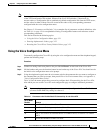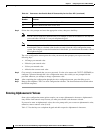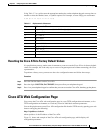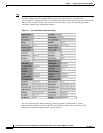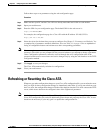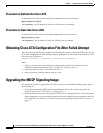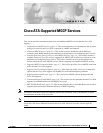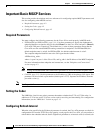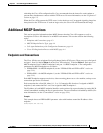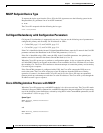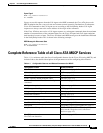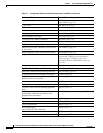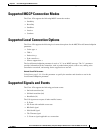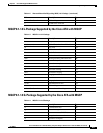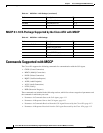
4-3
Cisco ATA 186 and Cisco ATA 188 Analog Telephone Adaptor Administrator’s Guide for MGCP (version 3.0)
OL-4803-01
Chapter 4 Cisco ATA-Supported MGCP Services
Additional MGCP Services
refreshing the Cisco ATA configuration file. Cisco recommends that the interval be semi-random to
prevent many simultaneous contacts with the TFTP server. For more information, see the “CfgInterval”
section on page 5-5.
When the Cisco ATA contacts the TFTP server, it also checks to see if an upgrade signaling image has
been placed on the TFTP server. If such an image exists, the Cisco ATA will download this image.
Additional MGCP Services
This section provides information about MGCP features that the Cisco ATA supports as well as
descriptions of Cisco ATA behavior in an MGCP environment. This section contains the following
topics:
• Endpoints and Connections, page 4-3
• MGCP Endpoint Device Type, page 4-4
• Call Agent Redundancy with Configuration Parameters, page 4-4
• Cisco ATA Registration Process with MGCP, page 4-4
Endpoints and Connections
The Cisco ATA has two telephone Foreign Exchange Station (FXS) ports. These ports are called port 0
and port 1. Port 0 is labeled Phone 1 on the Cisco ATA and port 1 is labeled Phone 2. Each port is an
MGCP endpoint: Port 0 is MGCP endpoint 0, and port 1 is MGCP endpoint 1. The configurable
parameters for MCGP endpoints are as follows:
• EPID0orSID0—for MGCP endpoint 0 (see the “EPID0orSID0 and EPID1orSID1” section on
page 5-14).
• EPID1orSID1—for MGCP endpoint 1 (see the “EPID0orSID0 and EPID1orSID1” section on
page 5-14).
Each MGCP endpoint supports one device, either an analog phone set or a fax machine, and up to two
connections per device are allowed.
Each connection has a fixed ID, either 0, 1, 2, or 3. Connection IDs 0 and are 2 assigned to MGCP
endpoint 0, and connection IDs 1 and 3 are assigned to MGCP endpoint 1.
The IP address of each MGCP endpoint identifier can be enclosed by square brackets by setting Bit 20
of the ConnectMode, enabling the use of square brackets. The use of brackets is disabled by default. (For
more information, see the “ConnectMode” section on page 5-24.)
Example
This example shows an EPID1orSID1 parameter value with brackets around the IP address of the
endpoint:
aaln/1@[128.107.139.111]



